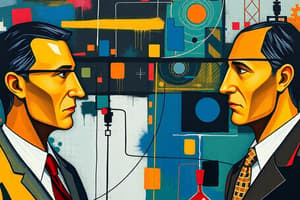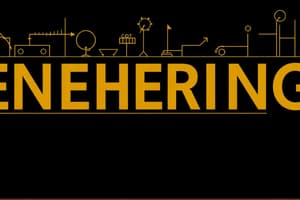Podcast
Questions and Answers
What defines a whistleblower within an organization?
What defines a whistleblower within an organization?
- A third-party consultant analyzing safety protocols.
- An individual who reports ethical violations internally.
- A supervisor overseeing compliance issues.
- An employee or former employee who reports serious moral problems. (correct)
What must a whistleblower do before taking their concerns outside the organization?
What must a whistleblower do before taking their concerns outside the organization?
- Discuss the issue with colleagues only.
- Exhaust all reasonable internal channels. (correct)
- Gather public opinion on the issue.
- Wait for an internal investigation to conclude.
Which of the following is NOT one of the moral guidelines for whistle-blowing?
Which of the following is NOT one of the moral guidelines for whistle-blowing?
- Internal efforts must be documented.
- Credible evidence supporting claims must be gathered.
- The potential harm must be minimal. (correct)
- The whistleblower must act in good faith.
What is a key motivation behind a whistleblower's actions?
What is a key motivation behind a whistleblower's actions?
Which of the following describes the act of whistle-blowing?
Which of the following describes the act of whistle-blowing?
What is considered a fundamental virtue for engineers that guides their actions?
What is considered a fundamental virtue for engineers that guides their actions?
Which of the following behaviors involves misleading others about one's expertise?
Which of the following behaviors involves misleading others about one's expertise?
What action can be considered dishonest even if no lies are told?
What action can be considered dishonest even if no lies are told?
Dishonesty undermines which essential aspect of individual autonomy?
Dishonesty undermines which essential aspect of individual autonomy?
An honest engineer is characterized by which of the following actions?
An honest engineer is characterized by which of the following actions?
Which of these is NOT a form of dishonesty mentioned in the context?
Which of these is NOT a form of dishonesty mentioned in the context?
Which ethical foundation is emphasized as crucial for trust in engineering?
Which ethical foundation is emphasized as crucial for trust in engineering?
What is the impact of dishonesty on social interactions according to the content?
What is the impact of dishonesty on social interactions according to the content?
What does falsification of data primarily involve?
What does falsification of data primarily involve?
Which of the following best defines plagiarism?
Which of the following best defines plagiarism?
What constitutes a trade secret?
What constitutes a trade secret?
What is the purpose of a patent?
What is the purpose of a patent?
In cases where public safety is at risk, what should take precedence?
In cases where public safety is at risk, what should take precedence?
Copyrights primarily protect which of the following?
Copyrights primarily protect which of the following?
What is the main ethical concern with the fabrication of data?
What is the main ethical concern with the fabrication of data?
Which legal protection would best suit a unique logo used by a business?
Which legal protection would best suit a unique logo used by a business?
Which of the following is a key role of government in protecting whistle-blowers?
Which of the following is a key role of government in protecting whistle-blowers?
What is an important aspect for organizations to foster in relation to ethical concerns?
What is an important aspect for organizations to foster in relation to ethical concerns?
What type of committee should organizations establish to handle ethical complaints?
What type of committee should organizations establish to handle ethical complaints?
How do engineering associations support whistle-blowers?
How do engineering associations support whistle-blowers?
What is essential for creating a culture of accountability regarding whistle-blowing?
What is essential for creating a culture of accountability regarding whistle-blowing?
What should engineers do when their ethical concerns are not being adequately addressed?
What should engineers do when their ethical concerns are not being adequately addressed?
What is a drawback of requiring employees to report ethical violations externally?
What is a drawback of requiring employees to report ethical violations externally?
Why is professional support for whistle-blowers important?
Why is professional support for whistle-blowers important?
Flashcards
Whistleblower
Whistleblower
An employee or former employee who exposes unethical or illegal activities within an organization.
Significant Moral Problem
Significant Moral Problem
The information revealed by a whistleblower should relate to a serious moral concern that affects the public, ethics, or legality.
Documentation
Documentation
A whistleblower must provide evidence to support their claims. This evidence should be credible and verifiable.
Internal Effort
Internal Effort
Signup and view all the flashcards
Good Faith
Good Faith
Signup and view all the flashcards
Honesty in Engineering
Honesty in Engineering
Signup and view all the flashcards
Respect for Persons
Respect for Persons
Signup and view all the flashcards
Lying
Lying
Signup and view all the flashcards
Deliberate Deception
Deliberate Deception
Signup and view all the flashcards
Withholding Information
Withholding Information
Signup and view all the flashcards
Seeking the Truth
Seeking the Truth
Signup and view all the flashcards
Trust in Engineers
Trust in Engineers
Signup and view all the flashcards
Ethical Foundations of Trust in Engineering
Ethical Foundations of Trust in Engineering
Signup and view all the flashcards
Falsification of Data
Falsification of Data
Signup and view all the flashcards
Fabrication of Data
Fabrication of Data
Signup and view all the flashcards
Plagiarism
Plagiarism
Signup and view all the flashcards
Trade Secrets
Trade Secrets
Signup and view all the flashcards
Patents
Patents
Signup and view all the flashcards
Trademarks
Trademarks
Signup and view all the flashcards
Copyrights
Copyrights
Signup and view all the flashcards
Client Confidentiality
Client Confidentiality
Signup and view all the flashcards
Legal Protections for Whistleblowers
Legal Protections for Whistleblowers
Signup and view all the flashcards
Professional Support for Whistleblowers
Professional Support for Whistleblowers
Signup and view all the flashcards
Public Awareness of Whistleblowing
Public Awareness of Whistleblowing
Signup and view all the flashcards
Open Communication Channels
Open Communication Channels
Signup and view all the flashcards
Ethics Review Committees
Ethics Review Committees
Signup and view all the flashcards
Professional Society Involvement in Whistleblowing
Professional Society Involvement in Whistleblowing
Signup and view all the flashcards
Internal Ethical Issue Resolution
Internal Ethical Issue Resolution
Signup and view all the flashcards
Whistleblowing
Whistleblowing
Signup and view all the flashcards
Study Notes
Lecture 8: Truth and Truthfulness
- Course: Introduction to Engineering and Ethics
- Instructor: Asst. Prof. Mete Öğüç
- Course Code: 1400111011
Trust and Reliability in Engineering
- Trust in engineers is paramount in a world reliant on specialized knowledge.
- This lecture explores the ethical foundations of trust, focusing on honesty, confidentiality, intellectual property, expert witnessing, public communication, and conflicts of interest.
Virtue of Honesty
- Honesty is a fundamental virtue in engineering.
- Engineers must be truthful and avoid deception, even when unobserved.
- Honesty is a deeply ingrained character trait that guides actions.
Respect for Persons
- Dishonesty undermines the moral agency of individuals.
- It prevents informed decision-making, violates autonomy, and restricts the ability to make free choices.
Forms of Dishonesty
- Lying: Intentionally conveying false or misleading information, a direct act of deception.
- Withholding Information: Deceptive omission of crucial details that others reasonably expect to know.
- Deliberate Deception: Misleading others about expertise or product value, not always involving a direct lie.
- Failure to Seek Truth: Honest engineers actively seek truth, even if it's inconvenient.
Dishonesty in Research and Testing
- Falsification of Data: Altering data to remove irregularities or present only favorable results, which can involve excluding relevant data. It can also entail misrepresentation of results.
- Fabrication of Data: Creating or reporting non-existent experimental data or results. A serious ethical violation with potential harm.
- Plagiarism: Appropriating someone else's work without permission or credit. It is a form of theft that undermines intellectual property integrity.
Protecting Intellectual Property
- Trade Secrets: Confidential formulas, patterns, or information used to gain competitive advantage.
- Trademarks: Words, phrases, or symbols that identify and distinguish goods/services.
- Patents: Government-granted rights to use, make, and sell an invention for a specified period.
- Copyrights: Protection of original expressions of creative works like books, music, and software.
Confidentiality in Engineering
- Client Confidentiality: Engineers have an obligation to safeguard sensitive client information shared or discovered during work.
- Public Safety vs. Confidentiality: When public safety is at risk, the obligation to protect the public may override client confidentiality.
- Line-Drawing Method: A method to determine boundaries between permissible and impermissible actions in complex confidentiality situations.
Defining Whistle-Blowing
- Employee/Former Employee: A whistleblower is an employee or former worker revealing information.
- Information Conveyed: The whistleblower reports the moral problem to someone with authority.
- Significant Moral Problem: The reported issue relates to a significant moral problem that affects public safety, ethics, or legality.
- Outside Approved Channels: Whistleblower bypasses internal channels and resists pressure to remain silent.
Moral Guidelines for Whistle-Blowing
- Serious Harm: The potential harm must be significant and likely to occur.
- Internal Effort: The whistleblower must exhaust all reasonable internal channels first.
- Documentation: Whistleblower must support claims with credible evidence.
- Good Faith: The act should be motivated by a genuine concern for the public good.
Protecting Whistle-blowers
- Legal Protections: Government and (in some cases) private sector employees are protected from retaliation for reporting safety/environmental violations.
- Professional Support: Engineering associations/employee groups provide advice and legal assistance.
- Public Awareness: Raising awareness is crucial for creating a culture of accountability.
Beyond Whistle-blowing
- Open Communication: Fostering open communication channels and internal mechanisms to address ethical concerns.
- Ethics Review Committees: Independent ethics committees can investigate complaints and provide recommendations for resolving ethical issues.
- Professional Society Involvement: Engineers can seek confidential advisory support from professional society ethics committees.
Studying That Suits You
Use AI to generate personalized quizzes and flashcards to suit your learning preferences.




